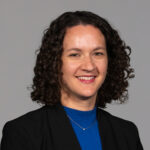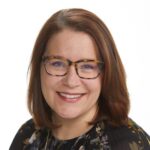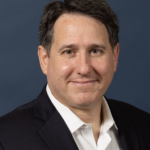Download
About the Authors
Karen Anderson
Karen Anderson is the Managing Director of the Social Finance Institute, a field-building platform launched in 2023 within Social Finance to advance outcomes-based approaches to social and economic mobility. She previously helped lead the Becker Friedman Institute for Economics at the University of Chicago, supporting more than 150 economists in translating research into impact. Anderson has held senior roles across government, think tanks, academia, and the private sector. She served as Senior Advisor to Results for America and Executive Director of Results for All, a global initiative focused on strengthening government effectiveness. Earlier, she was Managing Director of The Hamilton Project at the Brookings Institution, an economic policy initiative she helped launch in 2006.
A veteran of two White Houses, Anderson was Chief of Staff at the Council of Economic Advisers under President Obama and a Regional Coordinator in the Clinton Administration. She also served as Vice President of State and Local Government Relations at Citigroup. She holds an MPP from Harvard Kennedy School and a BA in Economics from Agnes Scott College.
Kristen Broady
Kristen Broady is a senior economist, economic advisor, and director of the Economic Mobility Project at the Federal Reserve Bank of Chicago. Broady is a nonresident senior fellow at the Brookings Institution, where prior to joining the Chicago Fed, she served as a fellow, performing research and analysis on areas including the impact of automation on the labor market, the racial wealth gap, returns to higher education investment, and the disparate economic impact of the COVID-19 pandemic. Broady is an adjunct professor of economics at Spelman College and has served on the faculties of higher education institutions including the University of Chicago, Dillard University, and Howard University, and as a visiting faculty member at Jiangsu Normal University in Xuzhou, China. She served as a consultant for the Joint Center for Political and Economic Studies; a senior research fellow for the Center for Global Policy Solutions; a consultant for the City of East Point, Georgia; and as an HBCU consultant for season two of The Quad on Black Entertainment Television (BET). Broady earned a BA in criminal justice at Alcorn State University and an MBA and PhD in business administration with a major in economics at Jackson State University.
Emily Wavering Corcoran
Emily Wavering Corcoran is senior manager of regional and community analysis at the Federal Reserve Bank of Richmond. She leads the team responsible for the Richmond Fed’s regional economic data products and community development research and analysis. Prior to re-joining the Richmond Fed in 2024, Corcoran served as a senior manager at the Federal Reserve Bank of Cleveland. She was responsible for administration, research and engagement for the Small Business Credit Survey, a collaborative effort by the 12 Reserve Banks of the Federal Reserve System. Corcoran also worked as a senior research analyst at the Richmond Fed from 2015 through 2021, where her research focused on consumer and small business credit access, community development financial institutions and neighborhood reinvestment strategies. Corcoran earned her BA in economics from St. Mary’s College of Maryland and her MPP from the College of William & Mary.
Maia Cotelo
Maia Cotelo is executive speechwriter and content strategist at the Federal Reserve Bank of Richmond. Before joining the Richmond Fed in 2021, she worked on public finance transparency with the USAspending.gov team at the Bureau of the Fiscal Service. Prior to that, she led research consulting engagements with higher education institutions and school districts at education research firm EAB. She earned her BA from the University of Mississippi and her MPA from Princeton University.
Tiffani M. Horton
Tiffani M. Horton is a senior adviser for the Community and Economic Development team with the Atlanta Fed’s Center for Workforce and Economic Opportunity. Leveraging expertise in research, policy, and practice, her work focuses on creating more robust pathways to economic mobility through education and workforce systems. Horton brings over a decade of experience as a leader at impact-driven organizations including, most recently, Education Strategy Group, a national consulting firm, where she offered technical assistance for organizations—government agencies, philanthropies, and higher education institutions—looking to increase opportunities for learners to access and complete meaningful credentials. After starting her career as a counselor on a college campus, Horton went on to work for academic affairs at the University System of Maryland, providing guidance to local educators, practitioners, and other stakeholders on improving pathways to college and career. She previously worked as a senior researcher at Temple University focused on higher education. She holds a PhD from New York University and a master’s degree from the University of Maryland–College Park, both in higher education.
Meg Massey
Meg Massey is the director of policy and communications at the Social Finance Institute. She is the co-author of Letting Go: How Philanthropists and Impact Investors Can Do More Good By Giving Up Control and her writing has appeared in numerous national and international publications. Her experience in outcomes-driven, impact-first funding models includes prior roles at the Urban Institute, GSG Impact, Upaya Social Ventures, and the White House Office of Management and Budget (OMB), where she worked on early Pay for Success models. She earned her BA from Mount Holyoke College and her MA in American government from Georgetown University.
Sarah Miller
Sarah Miller serves as a director and principal adviser for Community and Economic Development and co-leads the Atlanta Fed’s Center for Workforce and Economic Opportunity. Her work focuses on research and community engagement on worker experiences in the labor market and their perspectives on employment stability and mobility. She has over 15 years of experience in workforce development, economic development, and education. Previously, she spent 10 years at the Council for Adult and Experiential Learning, a national nonprofit where she helped develop and grow workforce and economic development area of service. Through her current and prior roles, she has conducted research and provided direct technical assistance on education alignment to business needs, occupational and career pathways, and workforce strategies supporting long-term economic mobility and resilience for a community and the workers and learners within it. Miller started her career focused on K–12 education as a high school social science teacher before moving into the private and nonprofit sectors. She earned her BS in education from Bowling Green State University.
Ashley Putnam
Ashley Putnam is the director of the Economic Growth & Mobility Project (EGMP), a strategic initiative of the Federal Reserve Bank of Philadelphia dedicated to promoting equal access to economic opportunity. EGMP is a multilevel effort to bring about entrepreneurial solutions to achieve inclusive economic growth and create pathways out of poverty in communities across the Third District and the nation. Before joining the Bank, Putnam served as the economic development adviser for the Mayor’s Office of Workforce Development in New York City, where she facilitated the coordination between economic and workforce development. In previous roles, Putnam founded and directed a fellowship program connecting young people to policy research and service on issues of urban poverty. She also served at the Department of Housing and Urban Development, America Works of New York, and the Women’s City Club of New York. Putnam has a MPA from New York University’s Robert F. Wagner School of Public Service and a BA from Barnard College.
David J. Socolow
David J. Socolow is Head of Policy at the Social Finance Institute, where he leads initiatives in collaboration with policymakers, researchers, and peer learning communities to build knowledge about outcomes-based policies and practices that expand social and economic mobility. Before joining in 2024, he spent over 30 years in government and the private sector championing education and workforce success. He most recently led New Jersey’s Higher Education Student Assistance Authority, where he created the state’s tuition-free college program and expanded career pathways and financing options for jobseekers. David previously served as New Jersey’s Labor Commissioner, as the state’s Unemployment Insurance Director, and in senior roles on Capitol Hill and at the U.S. Department of Labor, Pinnacle Foods, Inc., and CLASP. He holds a BA from Harvard College and an MPA from Rutgers University.









